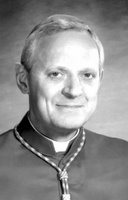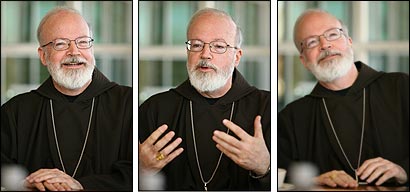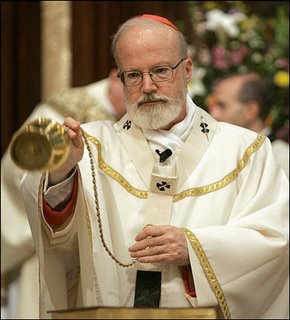 *ENGLISH EXCLUSIVE*
*ENGLISH EXCLUSIVE*This morning, the Pope greeted and addressed a sizable delegation of Jesuits at the close of a Mass in St Peter's Basilica to mark the Society of Jesus' Tri-Jubilee
year of its founders, commemorating the the 450th anniversary of Ignatius of Loyola's death, the 500th birthday of St. Francis Xavier and the 500th birthday of Bl. Peter Faber.
Benedict XVI is shown above greeting the Society's "Father-General," Peter-Hans Kolvenbach, who announced in late January that he intends to break the tradition of his predecessors dating back to Ignatius of Loyola and retire at the Company's
35th General Congregation, which will convene in January, 2008.
Below is the
Whispers translation of the Pope's remarks to the Jesuits in attendance, and the Society at large, as recorded in Italian by the Holy See.
***********************************
Dear Fathers and Brothers of the Company of Jesus,
It is with great joy that I meet you in this historic Basilica of St Peter, after the Holy Mass celebrated for you by Cardinal Angelo Sodano, my Secretary of State, on the occasion of various Jubilee occurrences of the Ignatian Family. To all I extend my cordial greeting. First, I greet the Superior General, Fr. Peter-Hans Kolvenbach, and I thank him for the kind words with which he has manifested to me your shared sentiments. I greet the Cardinals, the Bishops and the priests and all those who have desired to participate in this event. Together with the Fathers and Brothers, I greet also the friends of the Society of Jesus here present, and among them the many religious men and women, the members of the Communities of Christian Life and of the Apostolate of Prayer, the students and former students with their families from Rome, from Italy and from Stonyhurst in England, the teachers and students of your academic institutions, your numerous collaborators. This visit of yours offers me the opportunity to thank together with you the Lord for having granted to your Company the gift of men of extraordinary sanctity and of exceptional apostolic zeal such as St Ignatius of Loyola, St Francis Xavier and Bl Peter Faber. They are for you the Fathers and Founders: it's right, therefore, that in this centenary year you recall with gratitude and look to them to lead you and make secure your spiritual path and that of your apostolic activity.
St Ignatius of Loyola was above all a man of God, who gave the first place of his life to God, to his greater glory and his greater service; he was a man of profound prayer, which found its center and its culmination in the daily Eucharistic Celebration. In this way he left his followers a a precious spiritual inheritance which must not be lost or forgotten. As a man of God, St Ignatius was a faithful servant of the Church, in which he saw and found the spouse of the Lord and the mother of Christians. And from the desire to serve the Church in a more useful and effective way was born the vow of special obedience to the Pope, who he classified as "our first and principal foundation" (Constitutions of the Society of Jesus, I,162). This ecclesial character, so specific to the Society of Jesus, continues to be present in your persons and in your apostolic activity, dear Jesuits, as you make yourselves able to encounter faithfully the Church's urgent necessities of each time. Among these, I find it important to mark out the cultural imperative in the areas of theology and philosophy, the traditional environs of the apostolic presence of the Society of Jesus, as well as the dialogue with modern culture which, [translation corrected in italics] while on one part can boast of marvelous progresses in the scientific realm, remains firmly marked by positivist and materialist scientism. Certainly, the force of promoting in close collaboration with the other ecclesial realities a culture inspired toward the values of the Gospel calls for an intense spiritual and cultural formation. For this reason, St Ignatius wished that young Jesuits be formed for many years in the spiritual life and in their studies. It is good that this tradition be maintained and reinforced, given the growing complexities and vastness of modern culture. Another great preoccupation for him was that of Christian education and the cultural formation of the young: from this impulse with he gave to the institution of the "colleges" [high schools], which, after his death, sprung up in Europe and across the world. Continue, dear Jesuits, this important apostolate maintaining unaltered the spirit of your Founder.
Speaking of St Ignatius we cannot leave behind a remembrance of St Francis Xavier, whose 500th birthday was marked on 7 April: not only their history which was interwoven for many years from Paris and Rome, but a unique desire -- it could be said, a unique passion -- moved and sustained them through different human events: the passion to give to God-Trinity a glory always greater and to work for the proclamation of the Gospel of Christ to the peoples who had been ignored. St Francis Xavier, who my predecessor Pius XI of venerated memory proclaimed "Patron of Catholic Missions," made his mission that of "opening new ways" to the Gospel "in the immense continent of Asia." His apostolate in the East lasted just ten years, but its fertility revealed itself wonderfully in the four and a half centuries of the life of the Society of Jesus, as his example sustained among the young Jesuits so many missionary vocations, and still remains the call that you may continue the missionary work in the great countries of the Asian continent.
If St Francis Xavier worked in the countries of the East, his confrere and friend from his years in Paris, Bl Peter Faber, Savoyard, born 13 April 1506, worked in the European countries, where the Christian faithful aspired to a true reform of the Church. A modest man, sensible, of a profound interior life and given to a strong rapport of friendship with all kinds of people, attracting in his time many young people to the Company, Blessed Faber spent his brief life in different European countries, especially in Germany, where by order of Paul III he took part in the diet of Worms, of Regensburg and of Spira, at conferences with the heads of the Reformation. It was a mode of practice in an exceptional way the vow of special obedience to the Pope "for the missions," becoming for all future Jesuits a model to follow.
Dear Fathers and Brothers of the Company, today you look with particular devotion to the Blessed Virgin Mary, remembering that on 22 April 1541 Ignatius and his first companions took their solemnn vows before the image of Mary in the Basilica of St Paul Outside the Walls. May Mary continue to keep watch over the Society of Jesus that each of its members carry in his person the "image" of Christ Crucified so to have a part in his resurrection. For this, I assure you of a remembrance in prayer, while to each one of you present and to your entire spiritual family I gladly impart my blessing, which extends to all the other religious and consecrated persons who have come to this Audience.
PHOTO: AP/Plinio Lepri-30-
 As many of you love it so much, here's the Whispers translation of today's Regina Caeli, delivered by Benedict XVI at the Window.
As many of you love it so much, here's the Whispers translation of today's Regina Caeli, delivered by Benedict XVI at the Window. As a side note: no, the SCV hasn't traded in its fleet.... Today was a continuation of one of those quaint Vatican traditions as Rome's "Red Passion" club of Ferrari enthusiasts gathered in the Square for their annual greeting from the Pope.
As a side note: no, the SCV hasn't traded in its fleet.... Today was a continuation of one of those quaint Vatican traditions as Rome's "Red Passion" club of Ferrari enthusiasts gathered in the Square for their annual greeting from the Pope.











